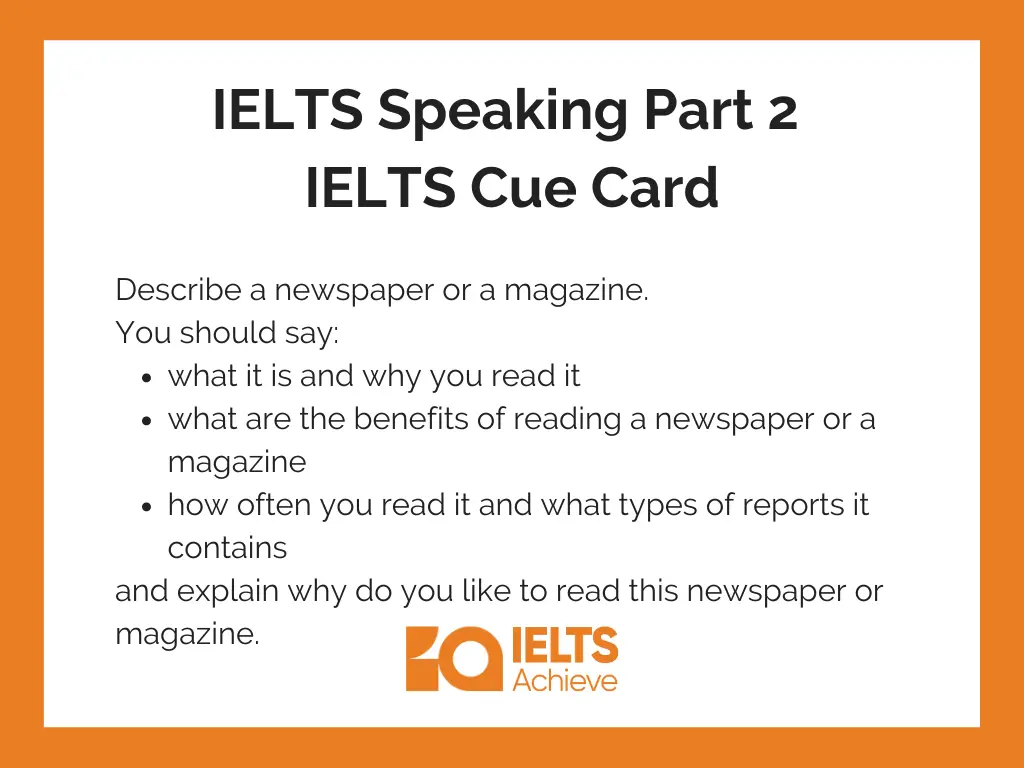
Describe a newspaper or a magazine. You should say: what it is and why you read it what are the benefits of reading a newspaper or a magazine how often you read it and what types of reports it contains and explain why do you like to read this newspaper or magazine.
Learn How To Answer IELTS Speaking Test Part 2 : CUE Cards.
Sample Response 1:
One of my favorite newspapers is “The New York Times.” I read it daily, primarily for its international coverage, in-depth analysis, and opinion pieces.
The benefits of reading “The New York Times” include staying informed about current events and developing critical thinking skills through exposure to different viewpoints. It contains various sections, including national and international news, business, technology, science, arts, and a range of opinions from leading commentators.
I particularly like this newspaper for its journalistic integrity and commitment to presenting nuanced perspectives. The writing is engaging and thought-provoking, often leading me to reflect on broader social and cultural issues.
Sample Response 2:
I regularly read the magazine “National Geographic.” It’s a monthly publication known for its stunning photography and deep explorations of nature, science, history, and culture.
The benefits of reading “National Geographic” are manifold. It educates readers about the world around them, promotes environmental awareness, and fosters a sense of curiosity. The magazine covers topics ranging from wildlife conservation to space exploration, ancient civilizations to cutting-edge technology.
What draws me to “National Geographic” is its ability to transport me to different parts of the world through its vivid imagery and compelling storytelling. It’s more than a magazine; it’s a window into the complexities and beauties of our planet.
Sample Response 3:
I frequently read “The Economist,” a weekly publication that offers in-depth analysis of world events, politics, economics, and business trends.
Reading “The Economist” provides me with a comprehensive understanding of global affairs and offers well-researched insights into various industries and markets. The magazine contains sections on international news, finance, science, technology, and even book reviews.
I appreciate “The Economist” for its clear, concise writing and unbiased reporting. It helps me make sense of the rapidly changing world and informs my professional decisions by keeping me updated on economic and business developments.
Explore Various IELTS Speaking Part 2 Cue Card Questions and Answers.
Recommended Vocabulary:
- International coverage: Reporting on events and issues that affect multiple countries.
- Example: I read “The New York Times” for its extensive international coverage of major world events.
- Journalistic integrity: Adherence to ethical guidelines, truthfulness, and honesty in reporting.
- Example: What I admire most about this newspaper is its commitment to journalistic integrity.
- Environmental awareness: Consciousness and concern about the environment and its preservation.
- Example: “National Geographic” promotes environmental awareness through its stories and pictures.
- Vivid imagery: Description or representation that produces strong and clear images in the mind.
- Example: The vivid imagery in “National Geographic” transports me to different parts of the world.
- In-depth analysis: A thorough and detailed examination of a subject or situation.
- Example: “The Economist” is known for its in-depth analysis of global economic trends.
- Comprehensive understanding: A complete and thorough grasp or knowledge of a subject.
- Example: Reading this magazine gives me a comprehensive understanding of world politics and business.
- Unbiased reporting: Presenting facts without showing personal feelings or prejudices.
- Example: I value “The Economist” for its unbiased reporting and well-researched insights.
- Nuanced perspectives: Subtle or slight variations of opinions or points of view.
- Example: This newspaper offers nuanced perspectives that encourage critical thinking.
- Manifold: Many and various; having many different parts or aspects.
- Example: The benefits of reading “National Geographic” are manifold, including education and entertainment.
- Compelling storytelling: Narration that captivates or holds the interest of the reader.
- Example: What makes “National Geographic” stand out is its compelling storytelling that makes each article a journey.
Different Cue Card Topics
Personal Experiences: IELTS Cue Card Topics
People and Personalities: IELTS Cue Card Topics
Places: IELTS Cue Card Topics
Objects: IELTS Cue Card Topics
Events: IELTS Cue Card Topics
Experiences and Achievements: IELTS Cue Card Topics
Hobbies and Interests: IELTS Cue Card Topics
Plans and Dreams: IELTS Cue Card Topics
Nature and Environment: IELTS Cue Card Topics
Education: IELTS Cue Card Topics
Work and Careers: IELTS Cue Card Topics
Technology: IELTS Cue Card Topics
Health and Fitness: IELTS Cue Card Topics
Food and Drinks: IELTS Cue Card Topics
